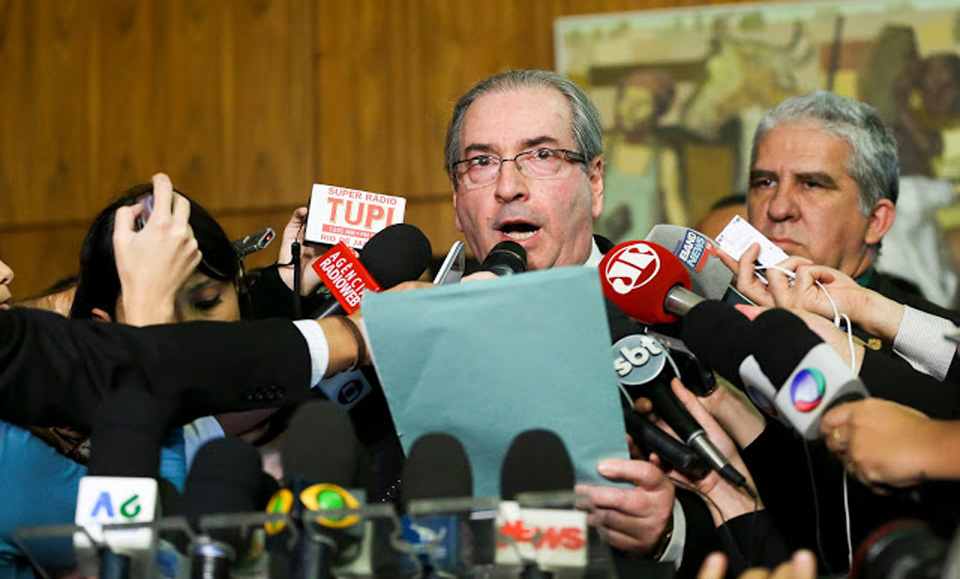
Eduardo Cunha, the formidable political power broker and former congressman who is considered to be the mastermind of the impeachment of President Dilma Rousseff of Brazil, has been arrested on multiple corruption charges. The question now is will he make a plea bargain in exchange for naming names? If he does, it could lead to a political earthquake in this country of 200 million people, the fifth most populous nation in the world.
All year long, the Brazilian public and millions beyond Brazil’s borders have watched the saga of the impeachment of President Rousseff. The role of Cunha in this drama has been commented on for months, and many accounts of the events mentioned Cunha’s role in lining up support for the impeachment and also a possible motive of blocking investigation of his own allegedly corrupt practices. In the Spring, Cunha and his allies moved in for the kill, and Rousseff was ousted August 31. But now the trap that Cunha set seems to have caught him also.
Eduardo Cunha, from Rio de Janeiro, is an evangelical Christian who has taken hard line conservative positions on issues such as abortion, LGBTQ rights, labor rights and other matters in which the outgoing Workers’ Party governments of Luiz Inacio Lula da Silva and Dilma Rousseff had introduced progressive reforms. He belongs to the Brazilian Democratic Movement Party, or PMDB. This is a non-ideological “big tent” party used for the purposes of advancing the careers of various politicians, but it is also the biggest party in the Chamber of Deputies. For a while, it was in a tactical alliance with the Workers’ Party (Partido dos Trabalhadores) of left wing presidents Lula da Silva and Rousseff, but broke that alliance earlier this year as the impeachment of Rousseff moved forward. (The president who was installed upon the ouster of Rousseff, Michel Temer, is also from the PMDB and is a former close Cunha ally.)
Lava Jato scandal
Cunha is accused as part of the Lava Jato (Jiffy Car Wash) scandal, in which numerous politicians and officials of several different political parties, as well some powerful business executives, have been investigated, and some jailed. They have been under investigation in kickback schemes involving construction companies bidding for contracts with Brazil’s vast parastatal oil company, Petrobras. Cunha is alleged to have pocketed up to $40 million in bribes. His name has also figured prominently in reports about the “Panama Papers” as a client of the Mossack-Fonseca company which many sleazy politicians have used for years to hide ill-gotten money. Some of the earlier arrestees have been “singing like canaries” in exchange for the possibility of reduced sentences, and this has the country’s political establishment very much on edge. And Cunha could turn out to be the most tuneful canary of them all.
Because of the corruption accusations, Cunha was ousted from his position as speaker of the Chamber of Deputies on May 5 of this year, and then on September 12 he was expelled from Congress and banned from political activities for eight years, which meant he lost the generous immunity from prosecution that federal legislators enjoy in Brazil. It was only a matter of time before the cuffs would be put on him, but he made it pretty clear at that time that he would not go quietly. Angry because he saw coup president Michel Temer and other right wing figures in Congress as having thrown him under a bus, Cunha announced that he was going to be writing a tell-all book in which all his conversations with his political contacts would be discussed. “Today it was me” he said at the time, “Tomorrow it could be you”. “I am going to tell about everything that happened, [my] dialogue with all the persons who participated in conversations with me. They will be made public, in their entirety. Everybody who conversed with me, everybody, everybody.”
Who will he take down with him?
At that point, a whole lot of political figures must have broken out into a sweat. But now comes the expected culmination. And the big fear is not just about the book, but about what and whom Cunha might hand over to prosecutors in the context of plea bargaining. More than one can play the game of throwing former allies under the bus.
On October 19, at the behest of Judge Sergio Moro, an ambitious jurist who has had a high profile in the Lava Jato investigation, Cunha was arrested in the capital, Brasilia, and taken to Curitiba in the south of the country and locked up. Judge Moro gave as justification for Cunha’s incarceration the fact that he has dual Brazilian-Italian citizenship, and that makes him a flight risk.
Cunha is accused of amassing a huge fortune by illicit and corrupt means. Particularly telling was the discovery that Cunha had lied about massive amounts of money he had salted away in secret Swiss bank accounts. His assets, amounting to 200 million reis , or 63 million U.S. dollars, have been frozen by order of the court.
While Cunha sits in a cell, isolated from other prisoners in the Lava Jato case, Temer’s government is moving ahead to undo all the social progress accomplished by the Brazilian people during the Lula and Rousseff administrations. But Temer himself is widely believed to be as dirty as Cunha: Specifically, he is accused of receiving kickbacks as “campaign contributions” from the Odebrecht Company, which was anxious to get contracts to do work for Petrobras. Also, so far three members of Temer’s cabinet have been forced to resign over a period of just a few months, also because of corruption scandals. So the question becomes: How long will it take for the scandal to catch up with Temer, and how will this affect his and his colleagues’ reactionary plans for the country?
Millions of Brazilians are not sitting around waiting for Temer to fall by himself, but are hitting the streets to defend their hard won economic and social gains.












Comments